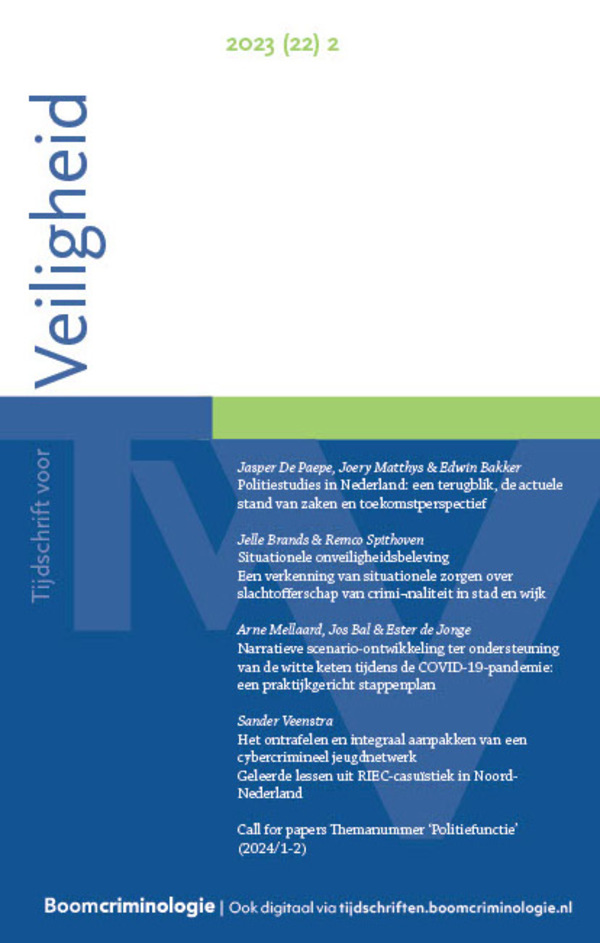|
In the local governance of public safety many different organizations are involved. These organizations cooperate in local networks or partnerships to manage problems related to crime and disorder. In the Netherlands the local government should coordinate the cooperation between these organizations and their activities. Research shows that in practice this coordination has many serious shortcomings. |


Tijdschrift voor Veiligheid
Over dit tijdschriftMeld u zich hier aan voor de attendering op dit tijdschrift zodat u direct een mail ontvangt als er een nieuw digitaal nummer is verschenen en u de artikelen online kunt lezen.
| Redactioneel |
De positie van de gemeente in de veiligheidszorgEen inleiding |
| Auteurs | Jan Terpstra en Arnt Mein |
| Auteursinformatie |
| Artikel |
Gemeentelijke regie in de veiligheidszorgSchets van relevante factoren en een wetsvoorstel |
| Trefwoorden | gemeente, regie, wetsvoorstel, lokaal veiligheidsbeleid |
| Auteurs | Jan Terpstra en Mirjam Krommendijk |
| SamenvattingAuteursinformatie |
| Artikel |
Versnipperde regieDe positie van de gemeente in een lokaal veiligheidsnetwerk |
| Trefwoorden | gemeentelijke regiefunctie, veiligheidsnetwerk, netwerkanalyse, doorzettingsmacht, centraliteit |
| Auteurs | Jolijn Broekhuizen, Ronald van Steden en Hans Boutellier |
| SamenvattingAuteursinformatie |
|
The coordination in public safety has been assigned to the municipality. The central question in this article is whether the municipality is equipped to fulfil this task successfully. In this study we investigated a metropolitan security network against drug and alcohol nuisance. Questionnaires were administered among 36 organisations dealing with these nuisance problems. The social network analysis shows that the municipality is predominant in the security network. On the other hand there are several other organisations, such as the Police, health organisations and Housing Associations, that also take up a central position in the network. We also found that the municipality’s informal network is less well developed than its formal network. In contrast, the Police and several local health organisations often liaise informally with other organisations that ‘fight’ drug and alcohol nuisance within the network. Quite a number of organisations are in the position to obtain important information and to exert influence when organisations are unwilling to cooperate. Consequently, several organisations other than the municipality are suited to successfully complete the coordination in a security network. |
| Artikel |
Uitbreiding bevoegdheden ter handhaving van de openbare orde en veiligheidEen versterking of verzwakking van de positie van de burgemeester? |
| Trefwoorden | bestuurlijke handhaving, burgemeester, bestuurlijke bevoegdheden, openbare orde |
| Auteurs | Arnt Mein |
| SamenvattingAuteursinformatie |
|
Lately, mayors’ powers for maintaining public order and safety have been considerably extended, and even more powers are in preparation. These powers must enable the mayor to act quickly against public order disturbances and security threats. The novelty is that the mayor may conditionally use and exercise these new powers preventively against groups of rioters. Their freedom of action and their privacy can also be considerably curtailed. This means these powers have to be used carefully and reluctantly. If the mayor overdoes the crimefighter role, he/she may lose the public’s confidence. |
| Artikel |
Gemeenten en de strijd tegen de georganiseerde misdaad |
| Trefwoorden | georganiseerde criminaliteit, bestuurlijke aanpak, BIBOB, gemeenten, evaluatieonderzoek |
| Auteurs | Wim Huisman |
| SamenvattingAuteursinformatie |
|
Municipalities play an increasingly important role in the fight against organized crime. Following Italian and New York examples, the Netherlands have developed several instruments for an administrative approach to organized crime. This article describes these instruments on a local and a national level and discusses its theoretical foundations. A critical assessment is made on the reach of this administrative approach considering the perception and nature of organized crime in the Netherlands. Further, methods for assessing the effectiveness of such an approach are discussed. Has organized crime successfully been targeted and how could this be established? |
| Artikel |
Lokaal veiligheidsbeleid in Nederland en België: op zoek naar verschil |
| Trefwoorden | lokaal veiligheidsbeleid, politie, gemeente, Nederland en België |
| Auteurs | Lex Cachet en Ruth Prins |
| SamenvattingAuteursinformatie |
|
Public safety has always been a core task for local, municipal authorities. However, until rather recently only the police has been actively involved in addressing local problems of public safety and maintaining order instead. Local public safety policy – as a responsibility for local authorities together with many other partners – is a relatively new phenomenon.This article compares the main developments and trends in local public safety policy in the Netherlands and Belgium. Special attention is paid to the role and position of the local, municipal authorities. What strikes most, are the strong similarities between the two countries. National governments played an important and catalyzing role in the development of public safety policy in the Netherlands as well as in Belgium. After many years and not without a lot of trouble, the monopoly of the police on designing and implementing policy for addressing public safety and order came to an end in both countries. Which, amongst other effects, presented the local authorities with new challenges. |
